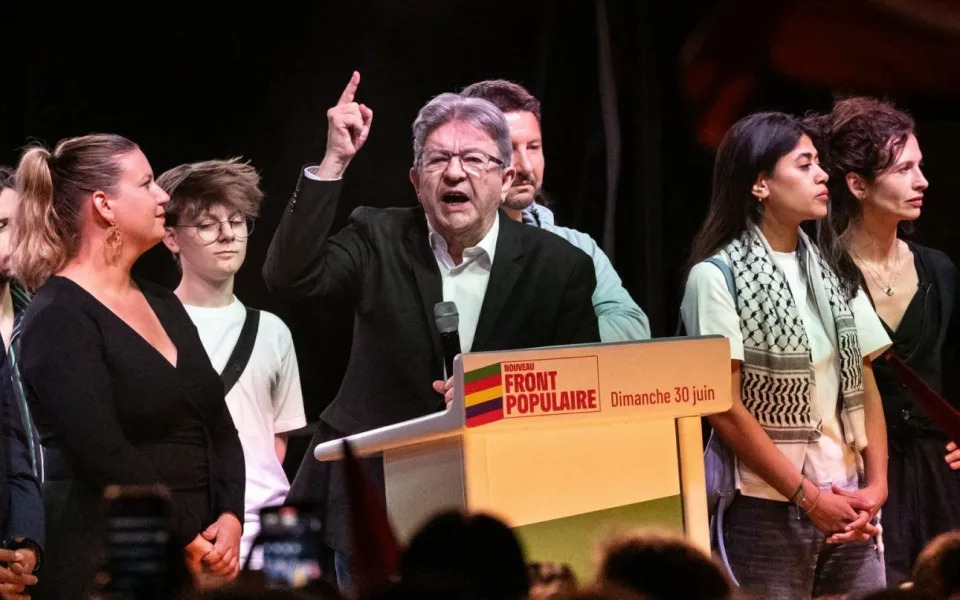
Emmanuel Macron's snap election has already cost France a quarter of growth, business leaders claim - Aurelien Morissard/Pool/AFP via Getty Images
Macron’s deal with hard-Left puts France on a collision course with Brussels
The Telegraph: The resurgence of Marine Le Pen’s National Rally party (RN) in the French elections has grabbed headlines.
But while investors are focused on the prospect of a hard-Right parliamentary majority after this weekend’s final National Assembly vote, Emmanuel Macron’s decision to align himself with the Left may have more serious implications for the French economy.
Its New Popular Front coalition is a hastily arranged marriage of bickering greens, socialists and communists who are promising to bring in controls on food prices, reinstate the right to retire at 60, significantly raise the minimum wage and increase business taxes.
If these policies were ever enacted, they would cost the country billions of euros – and risk tipping the French economy into a bigger crisis than ever.
France’s Unbowed party, led by populist firebrand Jean-Luc Mélenchon, is the most radical of the lot.
His previous Leftist alliance fell apart over Mélenchon’s refusal to brand Hamas a terrorist organisation after its Oct 7 attack against Israel.
Mélenchon also recently compared the head of Lille University to a Nazi for cancelling a conference on Palestine at which he was due to speak.
Despite the controversy surrounding the hard-Left, France’s prime minister Gabriel Attal has appealed for voters to block Le Pen and the party’s prime ministerial candidate Jordan Bardella from securing an outright majority.
More than 200 candidates representing either the Left-wing alliance or Macron’s centrist bloc have withdrawn their names from the ballot paper to give their political rivals the best chance of beating the RN this weekend.

Left-wing firebrand Jean-Luc Melenchon is the most radical in the loose collection of parties co-operating as the New Popular Front - Arnaud Finistre/AFP via Getty Images
Le Pen has pledged to cut VAT on energy bills, return the state pension age to 62 and exempt all under-30s from income tax.
But these proposals look fiscally tame compared with the Left’s manifesto, which vows to begin a “rupture” within 15 days of gaining power, tearing up seven years of reforms presided over by Macron.
Analysis by the Institut Montaigne think tank found that rolling back Macron’s deeply unpopular increase in the state pension age from 64 to 60 would cost €58bn (£49bn) a year. Capping the prices of gas, food and other essentials would cost €24bn, according to the institute.
The Leftist coalition has also vowed to increase the number of income tax bands from five to 14, with lower earners paying less tax. It will also restore the wealth tax abolished by Macron and increase inheritance tax.
In total, the NFP’s pledges are estimated to cost nearly €95bn a year once fully rolled out.
This is double the cost of National Rally’s policies of €48bn. Macron’s centrist plan suggests extra spending of around €15bn, the think tank added.
In World
-
Volodymyr Zelensky has warned European leaders Donald Trump will ignore them if the continent doesn’t take better care of its own defences.
-
President Donald Trump signed an executive order temporarily suspending all U.S. foreign assistance programs for 90 days pending reviews to determine whether they are aligned with his policy goals.
-
President Donald Trump ordered the U.S. to withdraw from the Paris climate agreement on Monday, once again placing the world's top historic emitter of greenhouse gases outside the global pact aimed at pushing nations to tackle climate change. Here are some reactions to the announcement of the second U.S. withdrawal from the climate pact:
-
Moldova and its separatist Transdniestria region inched towards a deal on Monday to allow gas to flow to residents of the rebel enclave, who have been suffering from power and heating cuts since the start of the year.












Leave a review